Immigrant Workers in the United States: A Closer Look at the H-1B Visa Program
A Boundless report uses public data to examine how the H-1B program has evolved over time
The H-1B visa program aims to address labor shortages in specialized fields like research, engineering, and computer programming by allowing American companies to hire skilled workers from around the world. This fosters innovation and growth in the U.S. economy. While critics argue it displaces U.S. workers and reduces wages, research indicates H-1B workers complement domestic workers, fill employment gaps in Science, Technology, Engineering, and Math (STEM) occupations, and expand job opportunities for everyone. The program was established in 1990 under the “Immigration Act of 1990” and is administered by United States Citizenship and Immigration Services (USCIS). Qualified companies sponsor foreign citizens’ petitions for the program.
Historical Context
It’s impossible to overstate the importance — and complexity — of the H-1B visa system. It’s the largest guest worker visa program in the United States, and arguably the most important channel for high-skilled immigration.
The H-1B visa program was signed into law in 1990, under the “Immigration Act of 1990” by President George W. Bush. However, the concept of leveraging immigration to bolster the U.S. labor force is nearly as old the country itself, beginning with the California Gold Rush, which drew an influx of Chinese immigrants to the U.S.
From railroad construction in the 1800s, to manufacturing in the early 20th century, and later the Bracero Program during World War II, immigration and immigration policy has always been a key driver of the United States’ global economic success.
The 1952 Immigration and Nationality Act (INA), also known as the McCarran-Walter Act, is loosely considered the foundation for the modern U.S. immigration system. It introduced various nonimmigrant visa categories, including H visas, which encompassed several subcategories for temporary workers.
Decades later, increased global competition from emerging economies in Asia and Europe, a shortage of STEM workers and an increased demand for high-tech talent, and bipartisan recognition of the importance of attracting skilled workers to maintain the nation’s technological edge culminated in the formalization of INA.
The scale and complexity of the program ebbed and flowed for 30 years, with the expansion of the H-1B cap, exemptions to the cap based on merit, increased application fees, issues with fraud, and more.
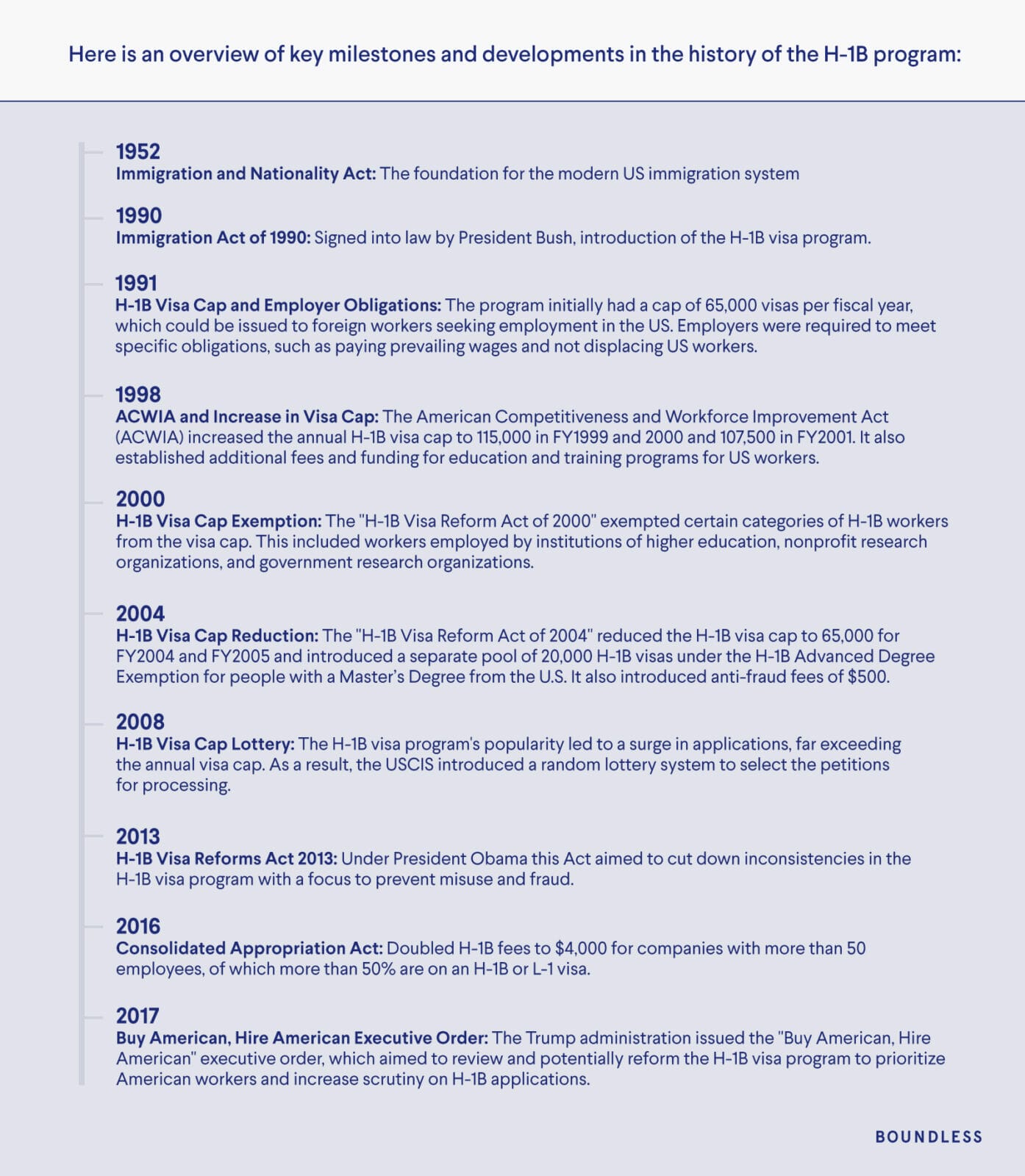
The H-1B Program Today
During his presidency, Donald Trump effectively tried to end the H-1B visa program as part of his larger efforts to restrict immigration. In April 2017, Trump signed his “Buy American and Hire American” executive order, a protectionist measure that made it more difficult for companies to hire highly-skilled foreign workers. Other actions to limit the program included suspending the option for expedited processing, increasing the minimum salary requirements, and re-adjudicating approved visas.
After President Joe Biden’s first year in office, the denial rate for H-1B visas dropped to 4%, a record low at the time. The Biden administration has made or proposed a number of changes to the H-1B visa program, including:
- Delaying the implementation of a Trump-era rule that would have replaced the lottery system with one that prioritizes the highest-paying jobs. This rule was challenged in court and is currently on hold.
- Codifying work authorization for the spouses of H-1B visa holders. This allows spouses of H-1B visa holders to work in the United States, helping to alleviate the financial burden on H-1B workers.
- Incentivizing higher wages for H-1B workers. The Biden administration has said that it is considering raising the wages that companies have to pay H-1B workers, which would discourage companies from hiring foreign workers at low wages.
- Raising fees. Biden has proposed increasing the fee for an H-1B application to $780, from $460 – a 70% increase.
The Biden administration has also taken steps to increase transparency and accountability in the H-1B visa program. For example, the administration has required that companies that sponsor H-1B workers provide more information about the wages they are offering and the qualifications they are seeking. This information will help to ensure that the H-1B visa program is used to fill genuine labor shortages, rather than to displace American workers.
How the H-1B Program Works: Annual Visa Limits
The H-1B visa program has an annual cap, which limits the number of new visas that can be issued each fiscal year. The cap applies to certain H-1B visas that are subject to numerical limitations. The annual cap is currently set at 65,000 visas for regular H-1B applicants. Additionally, there is a separate allocation of 20,000 visas for individuals who have obtained a master’s degree or higher from a U.S. institution.
The H-1B visa application period typically opens in March or April of each year, and the visas become effective on October 1, the start of the new fiscal year.
Due to the popularity of the H-1B program, the number of applications often exceeds the available visas. When the cap is reached, USCIS conducts a lottery to randomly select the petitions that will be processed for visa issuance. Petitions not selected in the lottery are generally returned to the applicants, and they must wait until the next fiscal year to reapply.
Certain H-1B petitions are not subject to the annual cap. These include petitions filed by institutions of higher education, nonprofit research organizations, and some employers located in areas of high unemployment.
H-1B Applications, Approvals, Denials
Despite recent widespread layoffs in the technology industry, one of the biggest employers of H-1B workers, demand for H-1B visas continues to skyrocket. During FY 2023, H-1B applications increased by 61% to 780,884, nearly 700,000 above the 85,000-annual cap.
H-1B approvals have steadily increased in recent years, even when comparing pre-pandemic numbers. In Fiscal Year 2022, USCIS approved 442,043 H-1B applications, more than each of the previous four years. USCIS accounts for H-1B petitions for both initial employment (a first-time H-1B application) and continuing employment (an extension of an existing H-1B visa) in that total. Taken separately, both categories saw an increase in 2022.
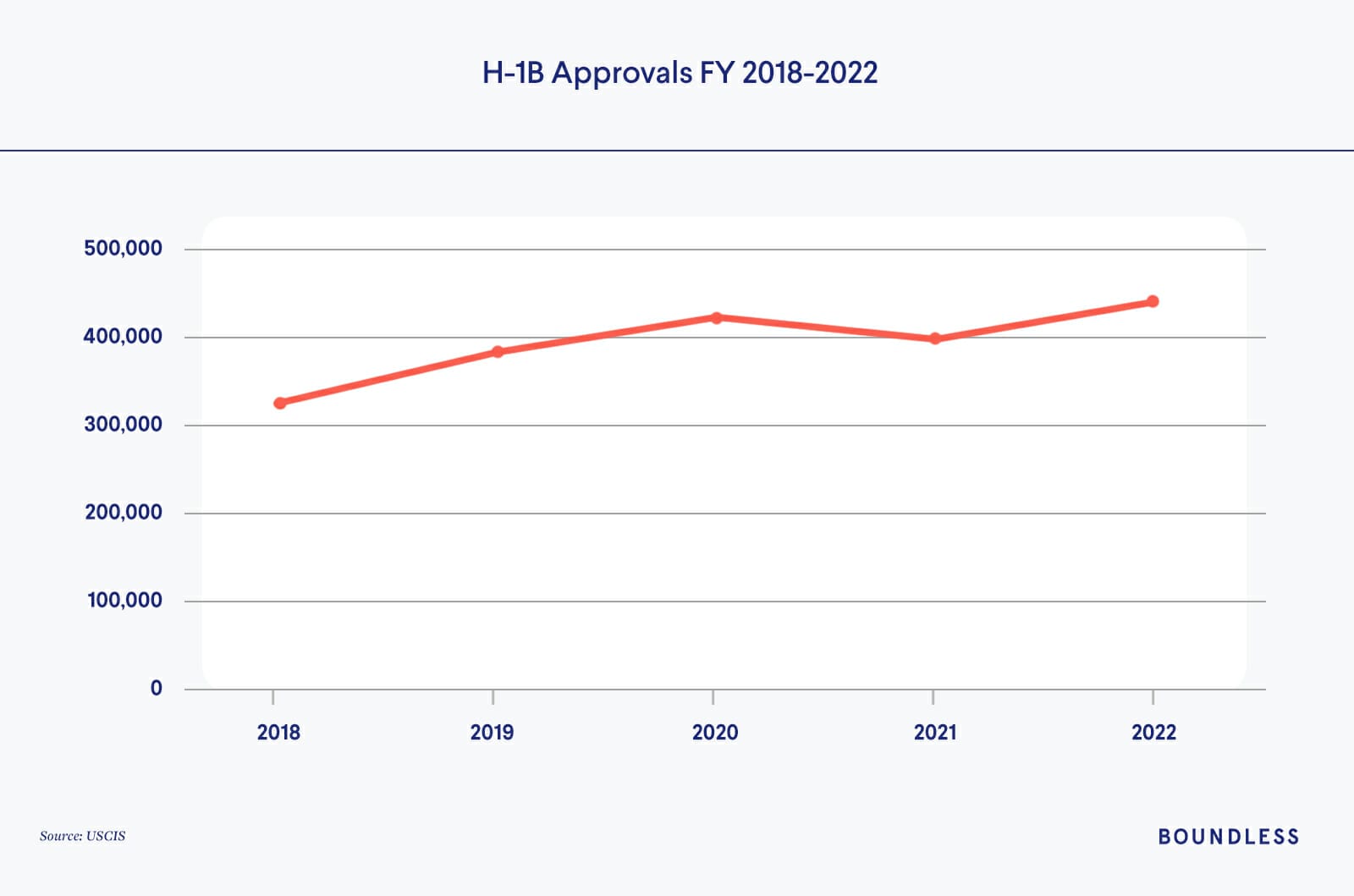
The denial rate in FY 2022 for initial employment was at a record low of 2%, compared to 4% in FY 2021. During the Trump administration, denial rates were at an all-time high due to restrictive immigration policies, reaching 24% in FY 2018. Under the Obama administration, denial rates ranged between 5% and 8%.
Generally, denial rates for H-1B applications tend to be low because of the significant cost and time to file a petition. According to nonprofit the National Foundation for American Policy (NFAP), an employer could pay between $3,900 and $18,150 in government and attorney fees for an initial H-1B petition, and as much as $31,800 for an initial application plus extension.
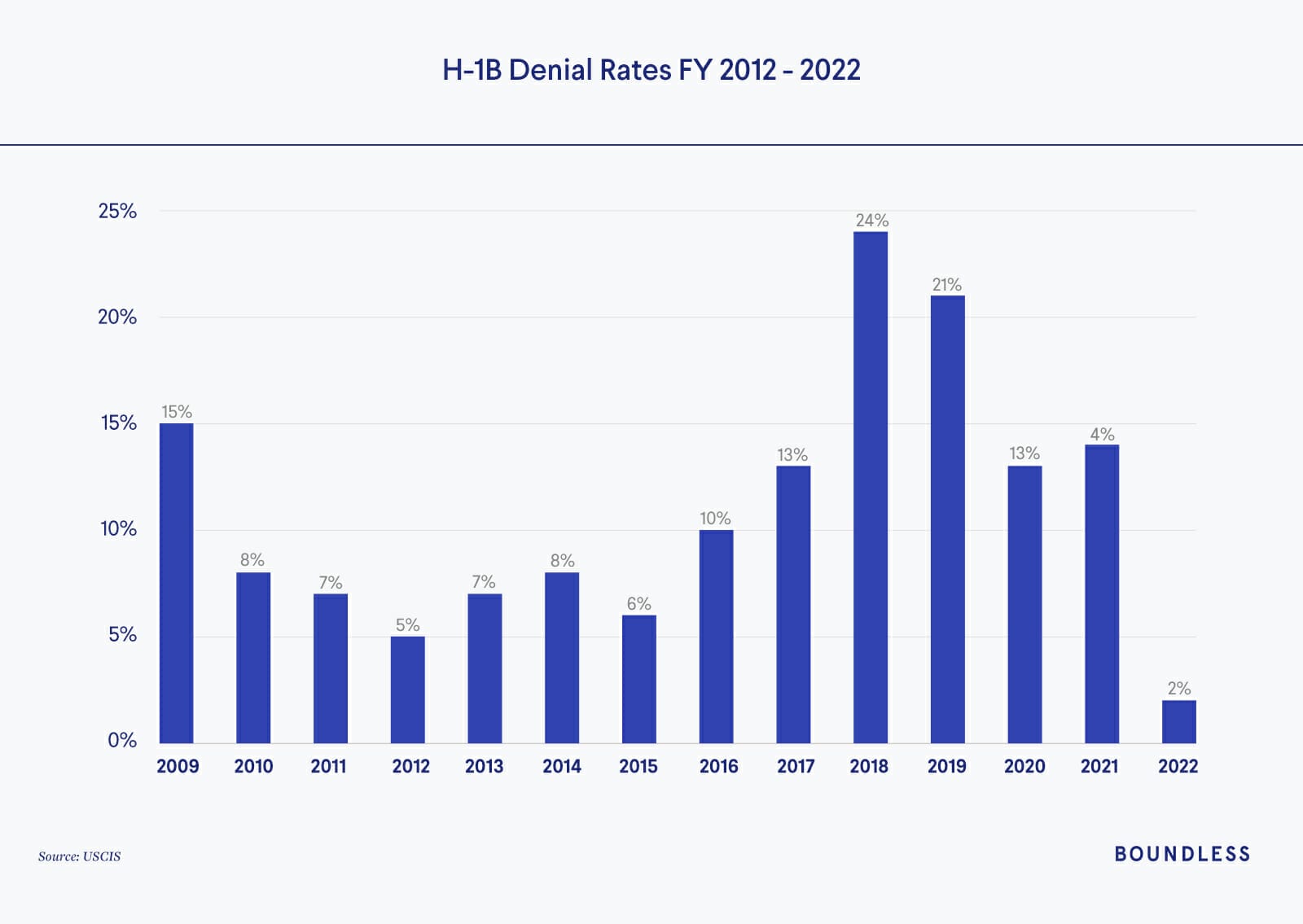
H-1B Visa Demographics
Country of origin
The majority of approved petitions (nearly 73%) in FY 2022 went to workers from India. China came in second, representing 12.5% of approved applications. The remaining top 8 countries accounted for nearly 6% of all approvals.
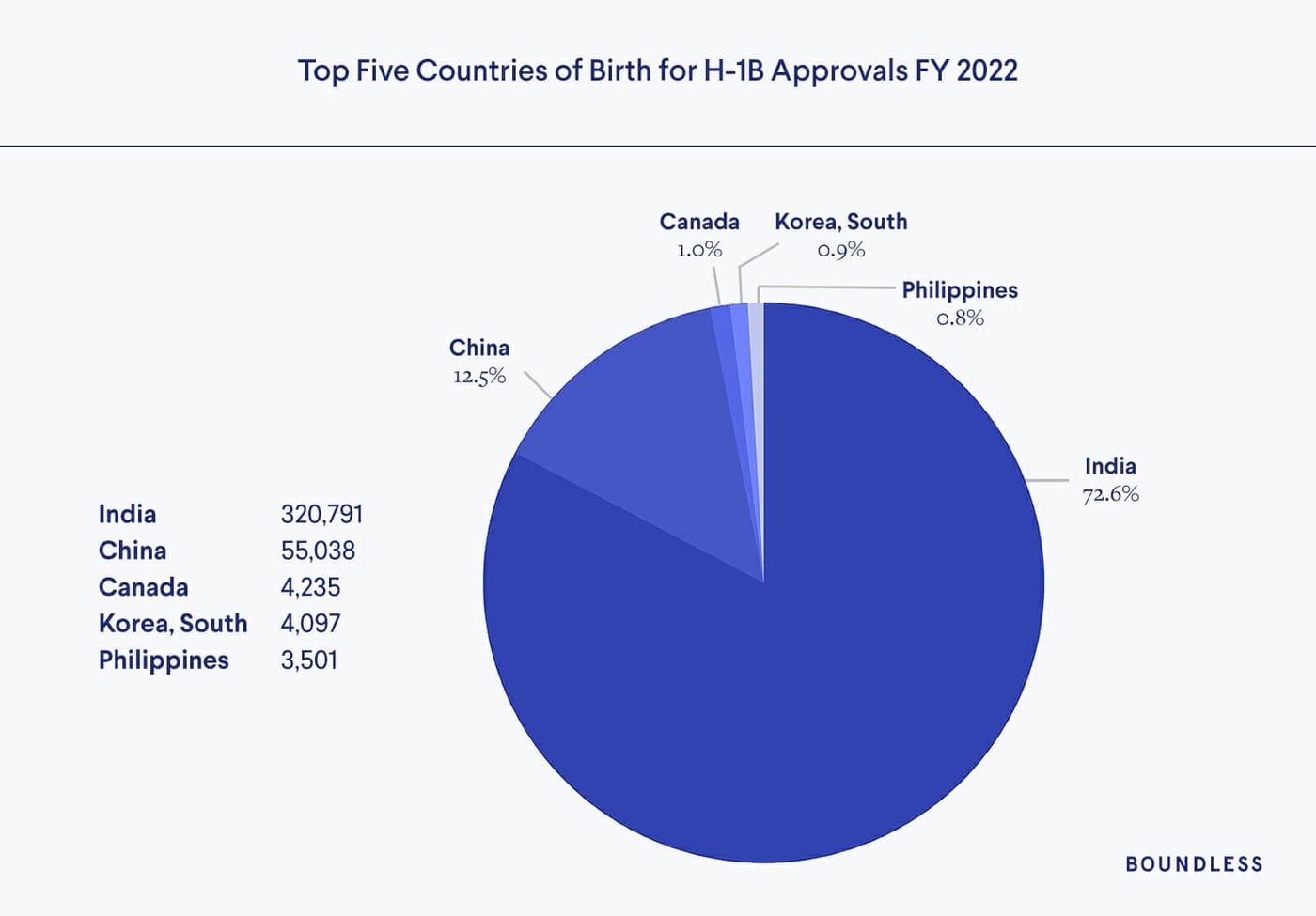
Age and gender
Males account for an overwhelming majority of all approved petitions – 70.8%, compared to 29% for female workers. However, the gender divide differs based on country. For instance, of all approvals for workers from the Philippines, 41.1% were male while 58.7% were female.
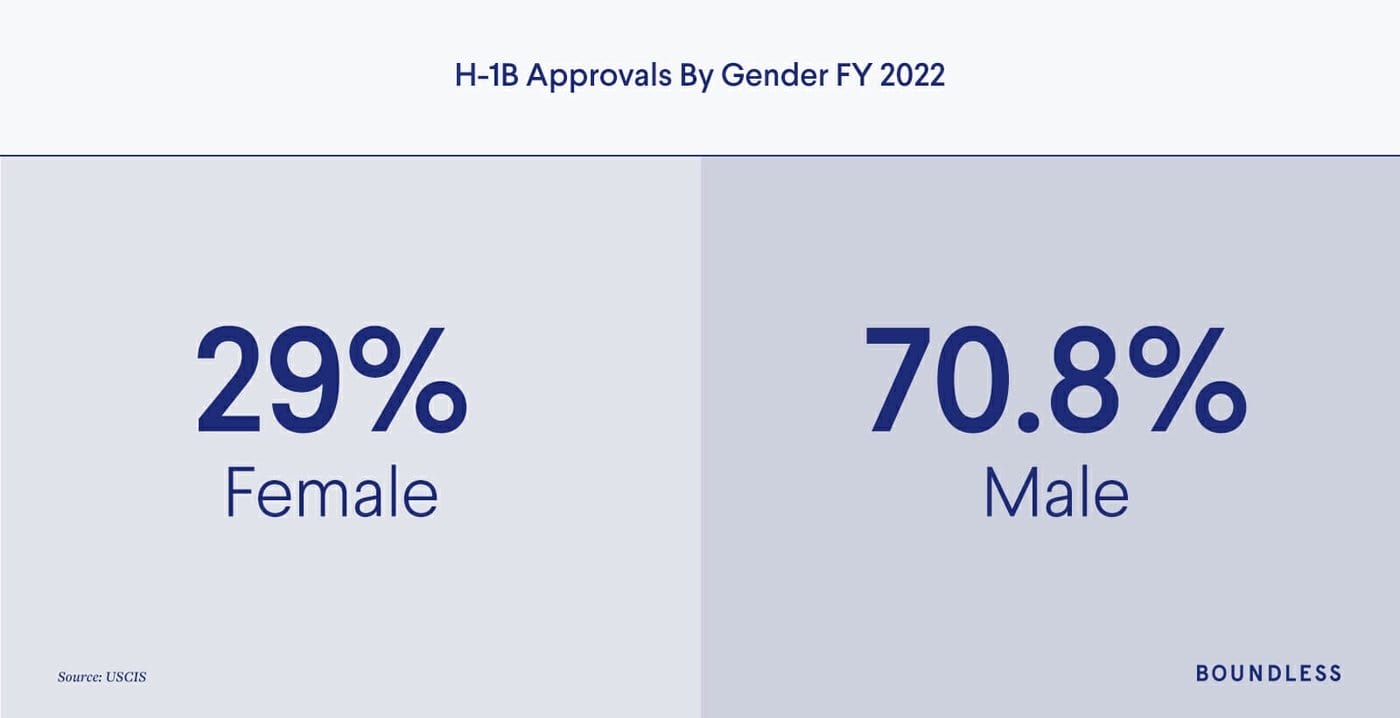
The median age of all approved H-1B workers in FY 2022 was 33 years old. Nearly two thirds of approvals for initial employment were between 25 and 34 years old. The age for continuing employment (extending an H-1B) skewed older, with nearly 63% aged between 30 and 39 years old. There were more male workers than female workers in every age category.
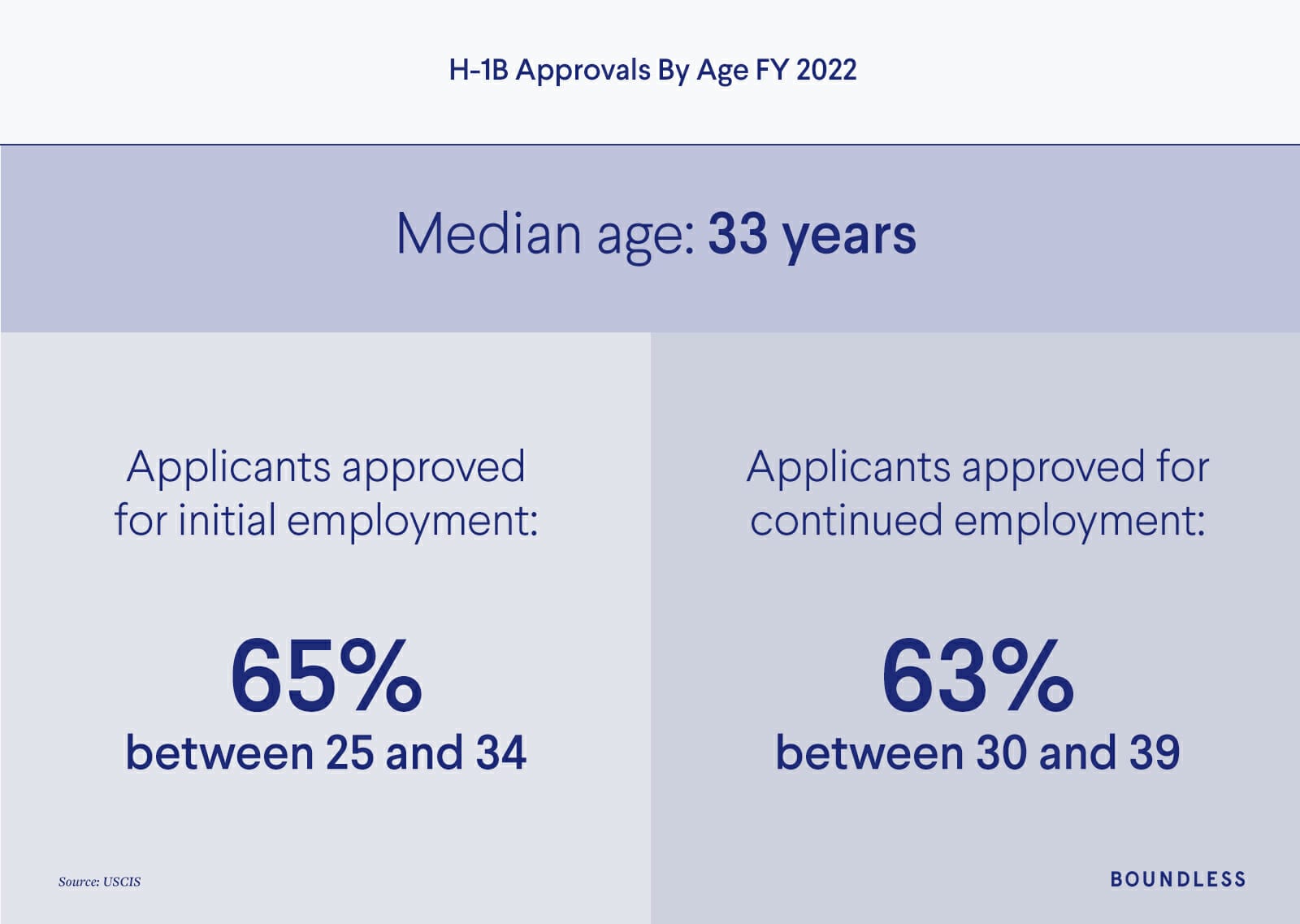
Top Occupations of Approved Petitions
Of all H-1B approvals in FY 2022, computer-related jobs were the top occupational group, making up 66% of all approvals. Within that field, jobs in systems analysis and programming accounted for nearly 55% of those approvals. Examples of positions in this field include software developer, systems engineer, mobile app developer, and software architect.
The second largest occupational category was architecture, engineering, and surveying with 9.8%.
Applications to extend an H-1B visa outnumbered first-time applications in every occupational category except education.
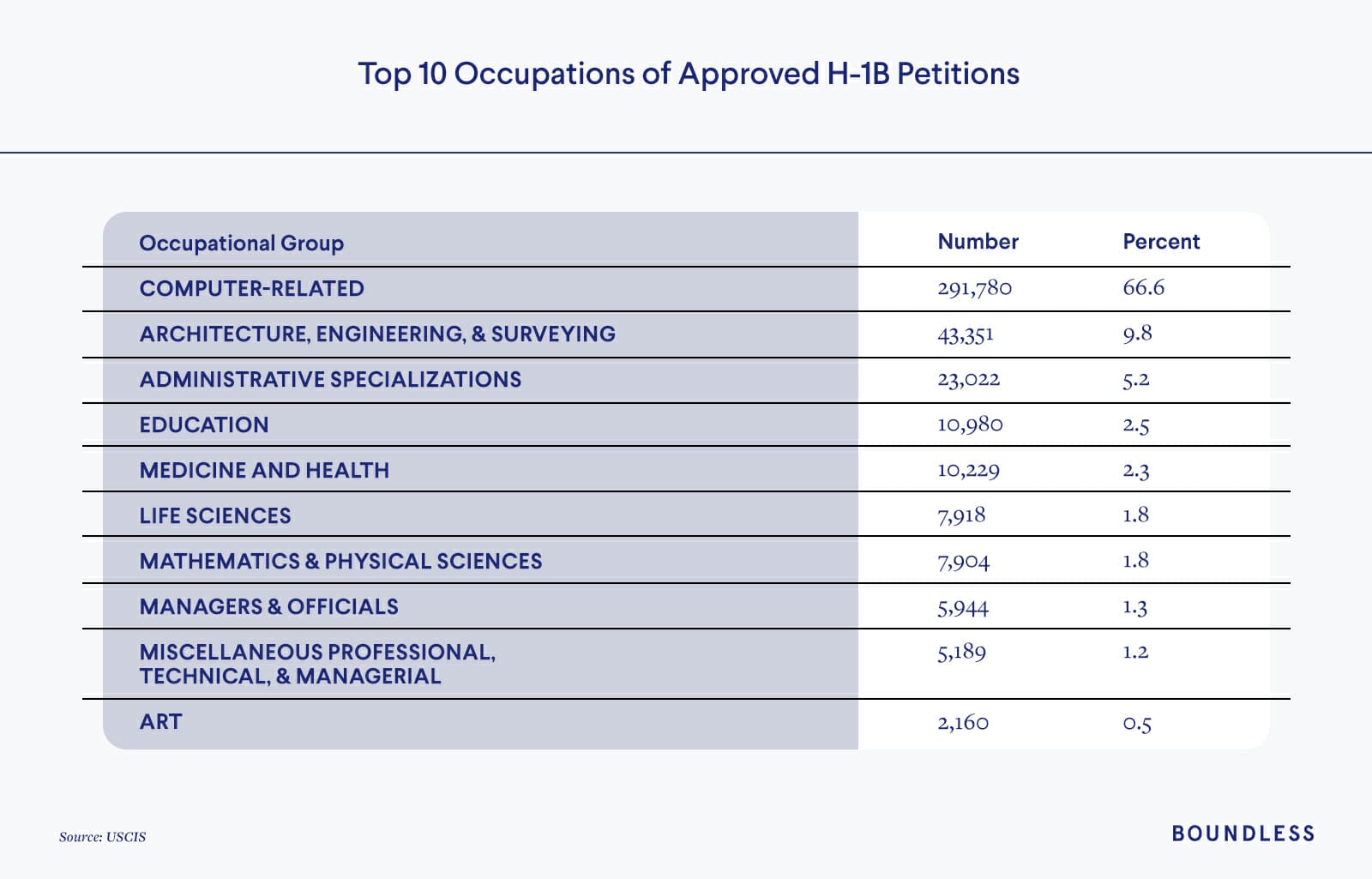
Median Annual Income
H-1B workers are generally highly paid, and their salaries tend to be in the top 10% of all wages in the United States. In FY 2022, the median annual salary for approved H-1B applicants was $118,000, up from $108,000 in FY 2021. The median annual salary in computer-related professions went up by 26% between 2018 and 2022. If the current pace continues, the average wage for computer-related jobs could rise to $200,000 within the next ten years.
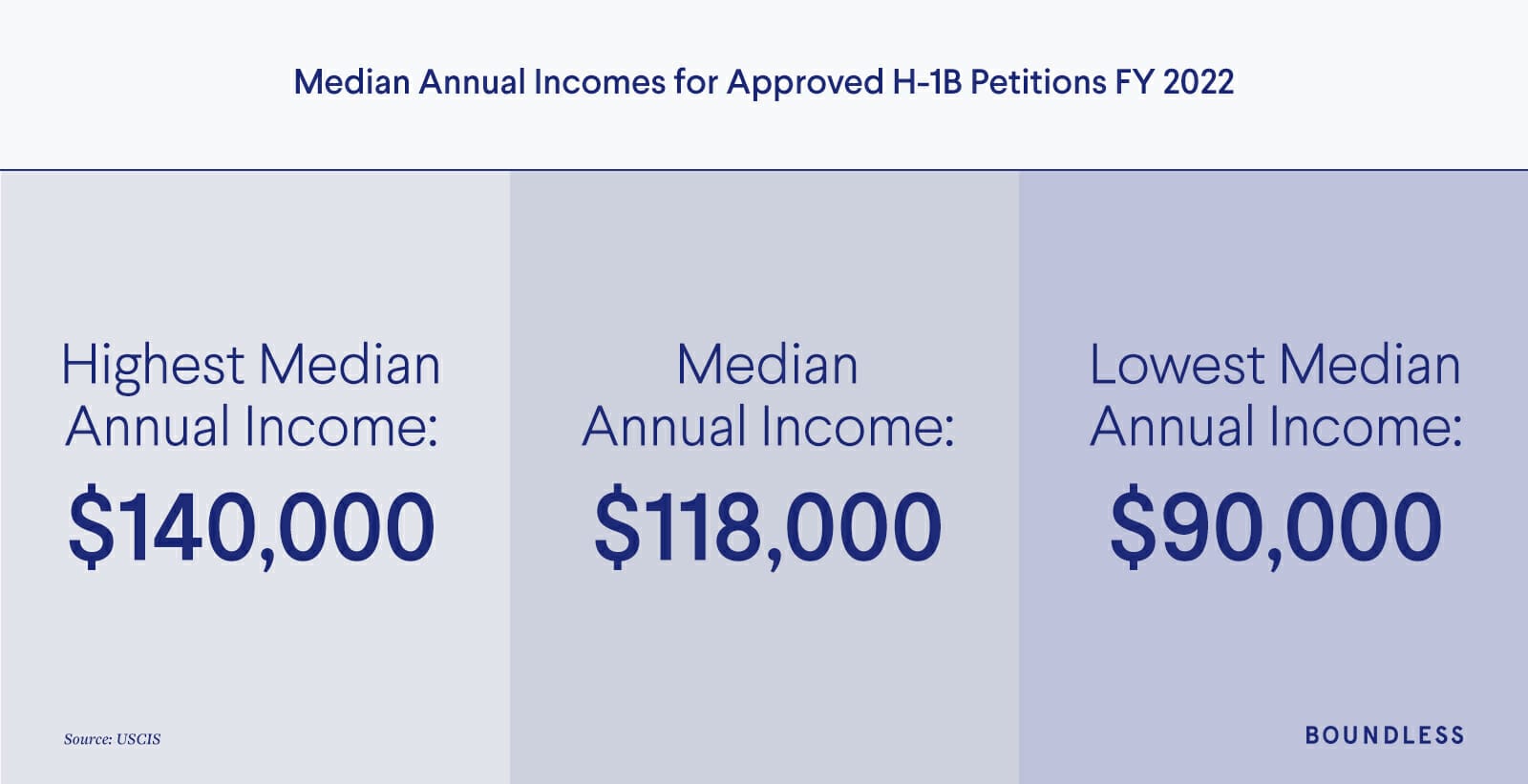
Critics of the visa program have touted the “cheap labor” myth, claiming that U.S. companies get away with paying H-1B workers lower wages compared to what they would have to pay American workers for the same job. However, numerous studies have found that highly-skilled foreign workers are not paid less than their U.S. counterparts.
Job Market and Economic Factors
Labor shortage
The United States is in the midst of a severe labor shortage, with too many job openings and not enough workers to fill them. As of July 2023, there were an estimated 9.8 million job openings, but only 5.8 million unemployed workers. Experts argue that immigrants are the answer to closing the labor gap, yet hiring a foreign worker on an H-1B visa is far from straightforward. U.S. employers face myriad challenges, including:
- Limited Quota: The U.S. government sets an annual cap on the number of new H-1B visas that can be issued. This cap can be reached quickly, resulting in a competitive process where employers need to file applications as early as possible to secure a visa for their desired employee.
- Stringent Requirements: Employers must demonstrate that the position they are hiring for requires specialized knowledge and skills that are not readily available in the U.S. labor market. This involves submitting detailed documentation and evidence about the job role, the company, and the qualifications of the foreign worker.
- Prevailing Wage Requirements: Employers are required to pay H-1B workers the prevailing wage for their occupation and geographic area. This is meant to ensure that foreign workers are not undercutting the wages of their U.S. counterparts.
- Complex Application Process: The application process involves multiple steps, including Labor Condition Application (LCA) filing with the Department of Labor and submission of Form I-129 with USCIS. The process can be time-consuming and requires careful attention to detail.
- Lottery System: When the demand for H-1B visas exceeds the annual cap, a lottery system is used to randomly select the applications that will be processed. This can result in uncertainty for both employers and employees.
- Policy Changes: The H-1B visa program has experienced changes in policies and regulations over the years, leading to shifting requirements and eligibility criteria. This adds an element of unpredictability for employers and foreign workers.
Job Losses
Mass layoffs in the tech industry in recent months left thousands of H-1B holders in a precarious position: they had 60 days to either find a new employer to sponsor them for an H-1B visa, change their status to a new visa, or return to their home country. Earlier this year, a presidential panel urged the U.S. government to extend the grace period to 180 days, but to no avail. Forcing highly-skilled foreign workers to leave harms America’s economic competitiveness. These workers not only ease the labor shortage by filling essential roles, but they also foster a culture of creativity and innovation within companies and go on to start companies and create jobs. More than half of America’s billion-dollar tech companies were founded by immigrants. Additionally, as these professionals work and reside in the U.S., they contribute to local economies through spending on housing, goods, services, and taxes, creating a positive multiplier effect that benefits various sectors.
Visa Fraud
H-1B visa fraud is not a new phenomenon, but it has become increasingly common in recent years. There are a number of reasons for this, including the growing demand for skilled workers in the United States, the complexity of the H-1B visa program, and the lack of adequate oversight.
Some of the most common forms of H-1B visa fraud include:
- Submitting fraudulent applications. This can involve submitting false information about the qualifications of the H-1B worker, the job duties that the worker will be performing, or the salary that the worker will be paid.
- Lying about the job location. Claims that the H-1B employee will be residing in the United States, when in reality the worker will be working in another country.
- Paying H-1B workers less than the prevailing wage. Although uncommon, this is a violation of the H-1B visa program, which requires that H-1B workers be paid the same wage as U.S. workers who are doing the same job.
- Abusing the H-1B visa program to displace U.S. workers. This can involve hiring H-1B workers to replace U.S. workers who are already employed by the company.
In recent years, there have been a number of high-profile cases of H-1B visa fraud. In 2022, the CEO of semiconductor company PerfectVIPs in San Jose, California, was indicted for allegedly submitting more than 80 fraudulent H-1B visa applications and laundering $1 million in fraud proceeds. In 2014, Infosys, an Indian IT outsourcing company, agreed to pay $34 million in a settlement following claims of “systemic visa fraud and abuse of immigration processes.”
USCIS has taken steps to combat H-1B visa fraud, including expanding worksite visits, making it easier for workers to report fraud, and prosecuting violators.
Future Outlook
The demand for skilled workers in tech and other industries is unlikely to abate in coming years, judging by the massive increase in H-1B applications each year. But the fate of the program rests largely on the political climate and who is in power. The Trump administration denied more H-1B applications than during any other period since the program’s inception. If Trump is reelected in 2024, it’s likely he’ll put the same or similar proposals on the table.
President Biden has said he would support increasing the number of available H-1B visas and make it easier for H-1B workers to transition to green cards. However, chances are slim these reforms will be passed by a divided Congress.
Making it easier for highly skilled foreign workers to live and work in the U.S. carries massive benefits. By allowing employers to access a diverse pool of skilled professionals from around the world, the H-1B program not only fills critical gaps in specialized industries but also fosters an environment of innovation and global collaboration. Foreign workers enrich the domestic workforce by introducing fresh perspectives, diverse skill sets, and novel ideas, all of which contribute to the nation’s economic growth and technological advancement.
About the Data
The following public sources were used:
- U.S. Citizenship and Immigration Services (USCIS). (2022). “H-1B Characteristics Congressional Report FY2022.” Retrieved from: https://www.uscis.gov/sites/default/files/document/data/OLA_Signed_H-1B_Characteristics_Congressional_Report_FY2022.pdf
- National Foundation for American Policy. (2022). “NFAP Policy Brief: H-1B Petitions And Denial Rates In FY 2022.” Retrieved from: https://nfap.com/research/new-nfap-policy-brief-h-1b-petitions-and-denial-rates-in-fy-2022/
- Lofstrom, M. & Hayes, J. “H-1Bs: How Do They Stack Up to US Born Workers?” (2011). Retrieved from: https://docs.iza.org/dp6259.pdf
- Chamberlain, A. for GlassDoor “Dispelling Myths: What H1B Visa Workers Are Really Paid.” (2017). Retrieved from: https://www.glassdoor.com/research/h1b-workers
- National Foundation for American Policy. (2022). “The Impact of H-1B Visa Holders on the U.S. Workforce.” Retrieved from: https://nfap.com/studies/the-impact-of-h-1b-visa-holders-on-the-u-s-workforce/
- U.S. Chamber of Commerce. (2023). “America Works Data Center: Capturing the current state of the U.S. workforce.” Retrieved from: https://www.uschamber.com/workforce/america-works-data-center
- Migration Policy Institute. (2023). “What Role Can Immigration Play in Addressing Current and Future Labor Shortages?” Retrieved from: https://www.migrationpolicy.org/research/immigration-addressing-labor-shortages
- New American Economy. (2019). “Entrepreneurship.” Retrieved from: https://www.newamericaneconomy.org/issues/entrepreneurship/
- National Foundation for American Policy. (2022). “NFAP Policy Brief: Immigrant Entrepreneurs and U.S. Billion-Dollar Companies.” https://nfap.com/research/new-nfap-policy-brief-immigrant-entrepreneurs-and-u-s-billion-dollar-companies/